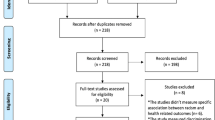Abstract
Little is known about Black–White health inequalities in Canada or the applicability of competing explanations for them. To address this gap, we used nine cycles of the Canadian Community Health Survey to analyze multiple health outcomes in a sample of 3,127 Black women, 309,720 White women, 2,529 Black men and 250,511 White men. Adjusting for age, marital status, urban/rural residence and immigrant status, Black women and men were more likely than their White counterparts to report diabetes and hypertension, Black women were less likely than White women to report cancer and fair/poor mental health and Black men were less likely than White men to report heart disease. These health inequalities persisted after controlling for education, household income, smoking, physical activity and body-mass index. We conclude that high rates of diabetes and hypertension among Black Canadians may stem from experiences of racism in everyday life, low rates of heart disease and cancer among Black Canadians may reflect survival bias and low rates of fair/poor mental health among Black Canadian women represent a mental health paradox similar to the one that exists for African Americans in the United States.
Similar content being viewed by others
References
Dunn JR, Dyck I. Social determinants of health in Canada’s immigrant population: results from the National Population Health Survey. Soc Sci Med. 2000;51(11):1573–93.
Newbold KB, Danforth J. Health status and Canada’s immigrant population. Soc Sci Med. 2003;57(10):1981–95.
Sampson RJ, Morenoff JD, Gannon-Rowley T. Assessing, “neighborhood effects:” social processes and new directions in research. Annu Rev Sociol. 2002;28:443–78.
Xanthos C, Treadwell HM, Holden KM. Social determinants of health among African-American men. J Mens Health. 2007;7(1):11–9.
James C, Este D, Thomas-Bernard W, Benjamin A, Lloyd B, Turner T. Race and well-being: the lives, hopes, and activism of African Canadians. Black Point, Nova Scotia: Fernwood Publishing; 2010.
Lebrun LA, LaVeist TA. Black/White racial disparities in health: a cross-country comparison of Canada and the United States. Arch Intern Med. 2011;171(17):1591–3.
Veenstra G. Mismatched racial identities, colourism, and health in Toronto and Vancouver. Soc Sci Med. 2011;73(8):1152–62.
Rosella LC, Mustard CA, Stukel TA, Corey P, Hux J, Roos L, Manuel DG. The role of ethnicity in predicting diabetes risk at the population level. Ethn Health. 2012;17(4):419–37.
Landrine H, Corral I. Separate and unequal: residential segregation and Black health inequalities. Ethn Dis. 2009;19(2):179–84.
Akinbami LJ, Moorman JE, Bailey C, et al. Trends in asthma prevalence, health care use, and mortality in the United States, 2001–2010. NCHS data brief, no 94. Hyattsville, MD: National Center for Health Statistics; 2012.
Fong E. A comparative perspective on racial residential segregation: american and Canadian experiences. Sociol Q. 1996;37(2):199–226.
Lloyd-Jones D, Adams RJ, Brown TM, Carnethon M, Dai S, De Simone G, Ferguson TB, Ford E, Furie K, Gillespie C, Go A, Greenlund K, Haase N, Hailpern S, Ho PM, Howard V, Kissela B, Kittner S, Lackland D, Lisabeth L, Marelli A, McDermott MM, Meigs J, Mozaffarian D, Mussolino M, Nichol G, Roger VL, Rosamond W, Sacco R, Sorlie P, Stafford R, Thom T, Wasserthiel-Smoller S, Wong ND, Wylie-Rosett J. Heart disease and stroke statistics—2010 update: a report from the American Heart Association. Circulation. 2010;121(7):E46–215.
Blackwell DL, Lucas JW, Clarke TC. Summary health statistics for U.S. adults: National Health Interview Survey, 2012. National Center for Health Statistics. Vital Health Stat. 2014;10:260.
Siegel R, Naishadham D, Jemal A. Cancer statistics, 2012. CA Cancer J Clin. 2012;62(1):10–29.
Zuvekas SH, Fleishman JA. Self-rated mental health and racial/ethnic disparities in mental health service use. Med Care. 2008;46(9):915–23.
Mouzon DM. Can family relationships explain the race paradox in mental health? J Marriage Fam. 2013;75(2):470–85.
Krieger N, Sidney S. Racial discrimination and blood pressure: the CARDIA Study of Young Black and White Adults. Am J Public Health. 1996;86(10):1370–8.
Chae DH, Lincoln KD, Adler NE, Syme SL. Do experiences of racial discrimination predict cardiovascular disease among African American men? The moderating role of internalized negative racial group attitudes. Soc Sci Med. 2010;71(6):1182–8.
Mays VM, Cochran SD, Barnes NW. Race, race-based discrimination, and health outcomes among African Americans. Annu Rev Psychol. 2007;58:201–25.
Hicken MT, Lee H, Morenoff J, House JS, Williams DR. Racial/ethnic disparities in hypertension prevalence: reconsidering the role of chronic stress. Am J Public Health. 2014;104(1):117–23.
Black PH. The inflammatory response is an integral part of the stress response: implications for atherosclerosis, insulin resistance, type II diabetes and metabolic syndrome X. Brain Behav Immun. 2003;17(5):350–64.
Puustinen PJ, Koponen H, Kautiainen H, Mäntyselkä P, Vanhala M. Psychological distress predicts the development of metabolic syndrome: a prospective population-based study. Psychosom Med. 2011;73(2):158–65.
Tull ES, Chambers EC. Internalized racism is associated with glucose intolerance among Black Americans in the U.S. Virgin Islands. Diabetes Care. 2001;24(8):1498.
Chambers EC, Tull ES, Fraser HS, Mutunhu NR. The relationship of internalized racism to body fat distribution and insulin resistance among African adolescent youth. J Natl Med Assoc. 2014;96(12):1594–8.
Bowleg L. The problem with the phrase Women and Minorities: intersectionality—an important theoretical framework for public health. Am J Public Health. 2012;102:1267–73.
Veenstra G. Race, gender, class, sexuality (RGCS) and hypertension. Soc Sci Med. 2013;89:16–24.
Veenstra G. Racialized identity and health in Canada: results from a nationally representative survey. Soc Sci Med. 2009;69(4):538–42.
Chiu MP, Austin DM, Manuel DG, Tu JV. Comparison of cardiovascular risk profiles among ethnic groups using population health surveys between 1996 and 2007. CMAJ. 2010;182(8):E301–10.
Hankivsky O. Health inequities in Canada: intersectional frameworks and practices. Vancouver: UBC Press; 2011.
Acknowledgments
This research was funded by a grant awarded to Gerry Veenstra by the Heart and Stroke Foundation of Canada (G-13-0002797).
Author information
Authors and Affiliations
Corresponding author
Rights and permissions
About this article
Cite this article
Veenstra, G., Patterson, A.C. Black–White Health Inequalities in Canada. J Immigrant Minority Health 18, 51–57 (2016). https://doi.org/10.1007/s10903-014-0140-6
Published:
Issue Date:
DOI: https://doi.org/10.1007/s10903-014-0140-6




